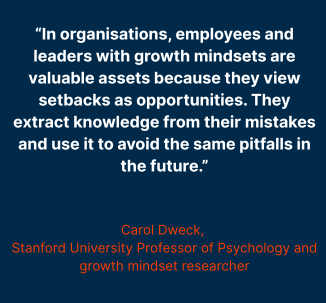By Christi Malthouse
We are all familiar with the expression “glass half full” right?
Where, if you see the glass as half full you are an optimist, and if you see it as half empty you are a pessimist.
But did you know that you can change the way you look at the glass?
It’s called growth mindset, a cornerstone skill which can be personally developed to enhance the way you lead your life.
Growth mindset can also be advanced in the workplace for general improvement in positive culture and productivity.
By Christi Malthouse
We are all familiar with the expression “glass half full” right?
Where, if you see the glass as half full you are an optimist, and if you see it as half empty you are a pessimist.
But did you know that you can change the way you look at the glass?
It’s called growth mindset, a cornerstone skill which can be personally developed to enhance the way you lead your life.
Growth mindset can also be advanced in the workplace for general improvement in positive culture and productivity.

Having a growth mindset essentially means that you see failure as an opportunity instead of an obstacle, a chance to develop and improve your talents, intelligence and abilities. When life gives you lemons, make lemonade!
The concept of a growth mindset was first introduced by Stanford University professor and psychologist, Carol Dweck over 30 years ago, after she studied the attitudes of students towards failure, and their ability to rebound from setbacks.
Growth mindset is all about having a positive attitude, and a self-awareness of your strengths, weaknesses, where you are and where you want to be.
“After thirty years, my research has shown that the view you adopt for yourself profoundly affects the way you lead your life. It can determine whether you become the person you want to be and whether you accomplish the things you value,” says Dweck.
The comparison between growth mindset v fixed mindset – where an individual believes their qualities are fixed traits that cannot be changed – allows us to see the potential for growth within an organisation with a simple switch of outlook.

A growth mindset means you actively look for opportunities to learn new skills, or improve existing ones. You see a challenge as a chance to grow, rather than anticipating failure. Hard work is your motto.
“The growth mindset is based on the belief that your basic qualities are things you can cultivate through your efforts. Although people may differ in every which way in their initial talents and aptitudes, interests, or temperaments, everyone can change and grow through application and experience,” says Dweck.
So therefore, the ability to transform the way you think begins with self-reflection.
Approaches to help develop a growth mindset include:
Embedding a growth mindset into your workplace culture can greatly impact the mental health of your employees by improving their ability to cope with stress. And if having a growth mindset can physiologically boost recovery following a stressful task, then so too can the way in which an organisation values learning and perseverance and how feedback is conveyed.
The goal of growth mindset in the workplace is to help employers and employees all learn and achieve more together.

Dweck’s research found that good managers don’t compete with their employees. They focus instead on improving themselves, and build teams of people who can continuously grow and develop together.
By placing value on development, growth and learning within your team, you are fostering growth mindset and promoting future success.
This is where feedback is important, and in particular, how it’s delivered. Keep the lines of communication open, and if a mistake is made take the time to walk through it and encourage your employees to take meaning from it.
And remember, it’s not just the thoughts, but the actions that are important. Growth mindset is following through and putting in effort. Afterall, as Carol Dweck puts it: “Why waste time proving over and over how great you are, when you could be getting better?”
Want to learn more about growth mindset?
The Readiness platform includes some fantastic resources for for anybody wanting to learn about growth mindset, as well as a range of other interesting personal development topics.
Readiness is proudly 100% Australian owned and built.